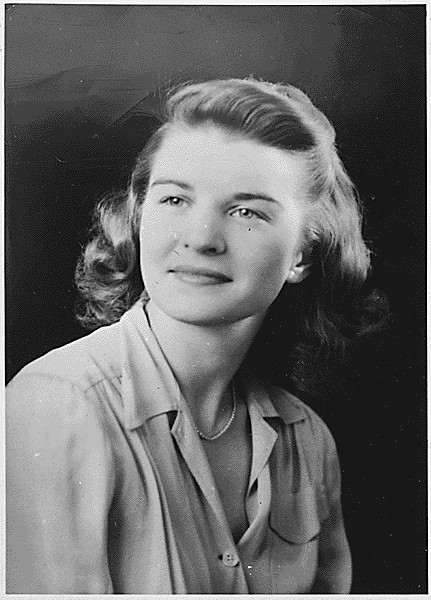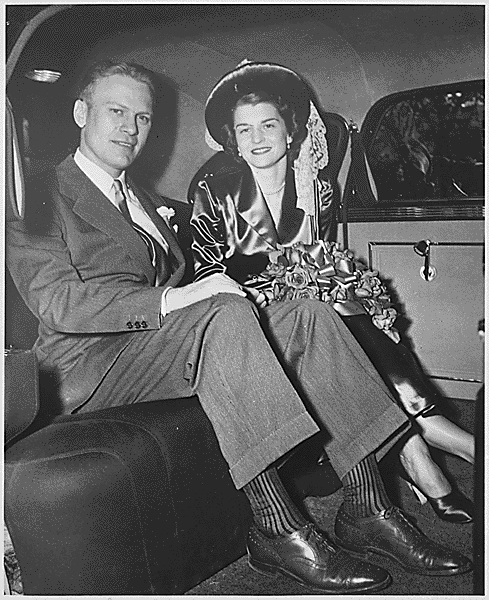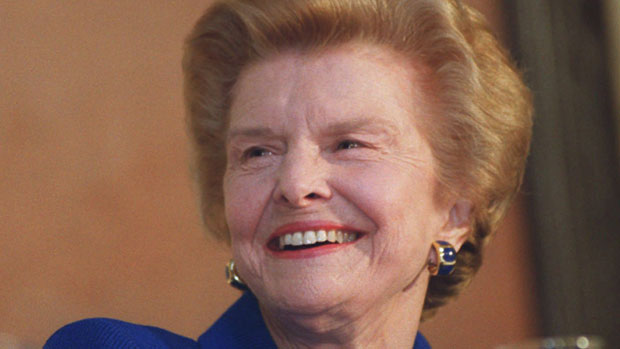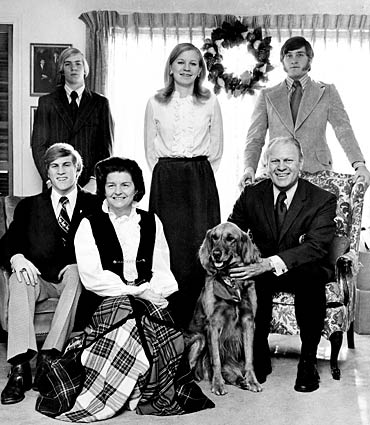|
|
|
First Lady of the United States (1918-2011) |
|
New
& Recent Conflicts
War
and Conflict
Links Portal
for pages on the history of
comics and superhero
characters Portal
for pages on the nations of the
world Portal
for pages on military history Lists
of wars throughout history and
from around the world Biographical
files on individuals who impact
American politics, culture,
business, education and other
arenas of life in the United
States. Pages
on the governmental systems of
selected nations. United
States national government and
politics. The
latest changes to the History Guy
site. Information
on the History Guy, the origin of
the website, along with
commentaries
and a site
map. |
"My
family joins me in sharing the difficult
news that Gerald R. Ford, our beloved
husband, father, grandfather, and great
grandfather, has passed away at 93 years
of age. His was a life filled with love of
God, his family, and his
country."--Betty
Ford's statement
of December 26, 2006 Gerald and
Betty Ford on their wedding
day First
Lady Betty Ford (1918-2011) Betty
Ford Elizabeth Ann "Betty" Ford
-
(April
8, 1918 – July 8,
2011) Betty
Ford was the First Lady of the United
States for only 30 months, but helped her
husband heal a nation torn apart by war
and political scandal. Betty Ford is also
well known for her public ordeal as an
addict and her part in the founding of the
iconic Betty Ford Clinic. Elizabeth
Ann "Betty" Bloomer, was born in 1918, the
daughter of William Stephenson Bloomer Sr.
and Hortense Neahr. Betty Bloomer attends
Central High School in Grand Rapids, MI.
She began lessons in ballet, tap and
modern movement and decided that she
wanted to pursue a career as a dancer.
She also taught dance to younger children
and worked as a model at
Herpolsheimer’s department store. Her
father died in 1934 of monoxide gas
poisoning in his garage. After her
high school graduation, Betty Bloomer
attended Bennington College School of
Dance in Vermont. She meets Martha
Graham, choreographer and founder of the
famous contemporary dance troupe. In 1939,
Miss Graham offers the 20-year old Betty
Bloomer an opportunity to attend the
Martha Graham School and she moved to New
York City. In order to earn extra money,
Betty worked as a model at the John
Robert Powers Agency. From 1940 to 1941,
she becomes a member of the Graham
auxiliary dance group and performed with
the Martha Graham Dance ensemble at
Carnegie Hall. After
returning home to Grand Rapids, Michigan
she married William Warren, an old friend
from her school days. The William and
Betty Warren moved often as William Warren
changds sales jobs frequently. Betty
eventually returned to Grand Rapids and
again accepts a job at
Herpolsheimer’s department store,
with a promotion to the position as the
fashion coordinator. Williamn Warren, was
an alcoholic, and was often in poor health
and just after Betty decided to file for
divorc,e he went into a coma. Betty
nursed him for another two years as he
recovered, and they finally divorced on
September 22, 1947. This first marriange
produced no children. In August,
1947, the the soon to be divorced Betty
Warren met Gerald Ford though some mutual
friends, and they married on October 15,
1948. The wedding took place in the midst
of Gerald Ford's first campaign for a seat
in Congress. He won the election, and, as
he won successive elections and gained
seniority in Congress, he also gained
political power. The
marriage of Gerald and Betty Ford produced
four children: Michael Gerald Ford (b.
1950), John Gardner Ford (nicknamed Jack,
b. 1952), Steven Meigs Ford (b. 1956), and
a daughter, Susan Elizabeth Ford (b.
1957). Gerald
and Betty Ford and their
family Ford's
influence in Congress grew even more when
his fellow Republicans selected him as
their leader in 1965. Since the Democrats
controlled the House by holding a majority
of the seats, the Republicans were called
the "minority party."As the leader of the
Republicans in Congress, Ford's new
position titled "House Minority
Leader." When
Vice-President Spiro Agnew resigned in
1973 because of criminal allegations
against him, President Richard Nixon chose
Gerald Ford as the new Vice-President.
After the House and Senate confirmed the
choice, Ford became the first unelected
(byAmerican voters) Vice-President of the
U.S. Gerald's
Ford's selection as the Vice-President
became of major importance when President
Nixon resigned on August 9, 1974. Gerald
Ford then became the first unelected (by
American voters) President of the U.S.
President Ford's first important decision
was to grant Nixon a full presidential
pardon, which prevented any legal action
against the former president for crimes he
may have committed while he was
president. With
Gerald Ford's rise to the Presidency,
Betty Ford of course became the 40th First
Lady of the U.S. Betty Ford, as
First Lady, quickly gained a reputation
for speaking plainly, and openly on topics
of concern to many families in the United
States. In a1975 interview with
McCall's magazine, Betty Ford said
that she was often asked just about
everything, except for how often she and
the president had sex. "And if they'd
asked me that I would have told them," she
said, adding that her response would be,
"As often as possible." After the stoic an
disciplined manner of her predecessor, Pat
Nixon, Betty Ford's openness and seeming
normality caused her, in some senses, to
be more popular than her husband the
President. Soon after becoming First Lady,
Betty Ford underwent a mastectomy for her
breast cancer on September 28, 1974. Betty
Ford's openness about her illness helped
remove the public stigma of a disease that
Americans had previously been reluctant to
talk about openly. "When other women have
this same operation, it doesn't make any
headlines," she told Time magazine.
"But the fact that I was the wife of the
President put it in headlines and brought
before the public this particular
experience I was going through. It made a
lot of women realize that it could happen
to them. I'm sure I've saved at least one
person—maybe more." Betty Ford was open about the benefits
of psychiatric treatment, and spoke
understandingly about marijuana use and
premarital sex, and, as a new First Lady,
frankly stated that she and the President
shared the same bed during a televised
White House tour. After Ford appeared on
60 Minutes in a typically candid
interview, she discussed how she would
counsel her daughter if she (the daughter)
were having an affair; stating that she
"would not be surprised," and she spoke on
the possibility that her children may have
experimented with marijuana. Some
political conservatives called her "No
Lady" but her overall approval rating was
at 75%. As she later said, during her
husband's failed 1976 presidential
campaign, "I would give my life to have
Jerry have my poll numbers." Some of
Ford's campaign siad, "Vote for Betty's
husband." Betty Ford was also an outspoken
advocate of women's rights and was a
prominent force in the Women's Movement of
the 1970s. The First Lady supported the
controversial Equal Rights Amendmen,t and
lobbied state legislatures to ratify the
proposed constitutional amendment. She was
also un-apologetically pro-choice (a very
controversial stance for a Republican) and
her active political role prompted
TIME magazine to call her the
country's "Fighting First Lady" and name
her "Woman of the Year," representing
American women along with other well-known
and influential feminists. Gerald
Ford ran for election (not, as many
pointed out, for re-election) in 1976,
winning the Republican nomination for
President only after a bitter and
hard-fought primary campaign against
California Governor Ronald Reagan. Fordwas
a moderate Republican, while Reagan was
the leader of the party's growing
conservative wing. Fordended up losing the
1976 election to Democrat Jimmy Carter, a
former governor of Georia. In 1978, the Ford family staged an
intervention and forced Betty Ford to
confront her alcoholism and an addiction
to pills that had been prescribed in the
back in the early 1960s for a pinched
nerve. "I liked alcohol," she wrote in her
1987 memoir. "It made me feel warm. And I
loved pills. They took away my tension and
my pain". In 1982, after her recovery, she
established the now-famous and iconic
Betty Ford Center in Rancho Mirage,
California, for the treatment of chemical
dependency. Betty Ford served as the
chairman of the Betty Ford Center's Board
of Directors until 2005, when her daughter
Susan took over leadership of the Betty
Ford Center. In 1978, the entire Ford family staged
an intervention and forced Betty Ford to
confront her alcoholism and an addiction
to pills that had been prescribed in the
back in the early 1960s for a pinched
nerve. "I liked alcohol," she wrote in her
1987 memoir. "It made me feel warm. And I
loved pills. They took away my tension and
my pain". In 1982, after her recovery, she
established the now-famous and iconic
Betty
Ford Center in Rancho Mirage,
California, for the treatment of chemical
dependency. Betty Ford served as the
chairman of the Betty Ford Center's Board
of Directors until 2005, when her daughter
Susan took over leadership of the Betty
Ford Center. In
January, 2006, President Ford was
hospitalized with pneumonia. He left the
hospital after a twelve-day
stay. President
Gerald Ford passed away on Tuesday,
December 26, 2006 at the age of 93. At the
time of his death, he was the longest
lived former president in U.S. history,
surpassing the late Ronald Reagan, who
also died at age 93. Betty Ford
passed away on July 8, 2011, at the age of
93. Books
by Gerald and Betty Ford: Books
about Betty Ford: Borrelli, Mary Anne. "Competing
Conceptions of the First Ladyship:
Public Responses to Betty Ford's 60
Minutes Interview." Presidential
Studies Quarterly, vol. 31, no.4,
397-414, 2001 Caroli, Betty Boyd. First Ladies.
New York: Oxford University Press,
1987. Carter, Rosalyn. First Lady from
Plains. Boston: Houghton Mifflin,
1984. Ford, Betty. Glad Awakening. Garden
City, NY: Doubleday, 1987. [Memoir
concerning Mrs. Ford’s recovery
from substance abuse and the founding
of the Betty Ford Center.] Greene, John Robert. Betty Ford:
Candor and Courage in the White House.
Lawrence, KS: University Press of
Kansas, 2004. Gutin, Myra. The President's
Partner: The First Lady in the
Twentieth Century. New York: Greenwood
Press, 1989. Gutin, Myra G. and Leesa E. Tobin.
“‘You've Come a Long Way, Mr.
President’: Betty Ford as First
Lady” in Gerald R. Ford and the
Politics of Post-Watergate America
edited by Bernard J. Firestone, and
Alexej Ugrinsky. Westport, CT:
Greenwood Press, 1993. Knopf-Newman, Marcy Jane. Beyond
Slash, Burn, and Poison: Transforming
Breast Cancer Stories into Action. New
Brunswick, NJ: Rutgers University
Press, 2004. Rosebush, James. First Lady, Public
Wife. Lanham, MD: Madison Books,
1987. Tobin, Leesa. “Betty Ford as
First Lady: A Woman for Women.”
Presidential Studies Quarterly, vol.
20, no. 4, 761-767, 1990. Troy, Gil. Affairs of State: The
Rise and Rejection of the Presidential
Couple Since World War II. New York:
The Free Press, 1997. Weidenfeld, Sheila Rabb. First
Lady's Lady: With the Fords at the
White House. New York: G.P. Putnam's
Sons, 1979. Quotes by
President Ford (source: http://www.ford.utexas.edu/grf/quotes.asp): "The
History Guy" is a Registered Trademark. Contact
the webmaster |
Join the
FREE Historyguy Update list. Receive regular
updates delivered right to your
inbox.
Email
Marketing You Can Trust The
Conflicts Dealt With by Gerald Ford,
1974-1977 Analysis of Ford's decisions on the Mayaguez
and Angola conflicts. Family,
Career, and Personal
Highlights William
Stephenson Bloomer Sr
(1874-1934)--Father Hortense
Neahr
(1884-1948)
-- Mother William
G. Warren (m. 1942–divorced
in 1947) Gerald
Ford
(1913-2006),
2nd
Husband, wed on October 15,
1948 Children: John
Gardner "Jack" Ford (b.
1952)--Son Steven
Meigs Ford (b.
1956)--Son Susan
Elizabeth
Ford
(b.
1957)--Daughter Religion:
Education: 1936-1937-attended
Bennington School of Dance in
Bennington, Vermont Career/Occupation: Links
and Resources on Gerald and Betty
Ford Gerald
R. Ford--Biography
of Gerald R. Ford. From the
official White House web
site. Gerald
Ford--Wikipedia
article Betty
Ford--Wikipedia
article The
Conflicts Dealt With by Gerald
Ford, 1974-1977 --Analysis of
Ford's decisions on the Mayaguez
and Angola conflicts. Gerald
R. Ford Library and
Museum
--Promotes popular interest and
scholarly research in U.S.
history during the post-World War
II era, especially the Ford
presidency (1974-77). President
Gerald Ford: Health & Medical
History--Medical history of
President Gerald R. Ford American
President.Org: Gerald
Ford--Website run by the
University of Virginia. Character
Above All: Gerald Ford Essay
--Excerpt from an essay about the
troubled childhood and political
career of Gerald Ford, who became
the 38th President of the United
States. By James Cannon. Former
President Ford Dead at
93--AP/Yahoo News. Site
Map--revision
in progress |
|||||||||||||||||||||||||||||||||||||||




